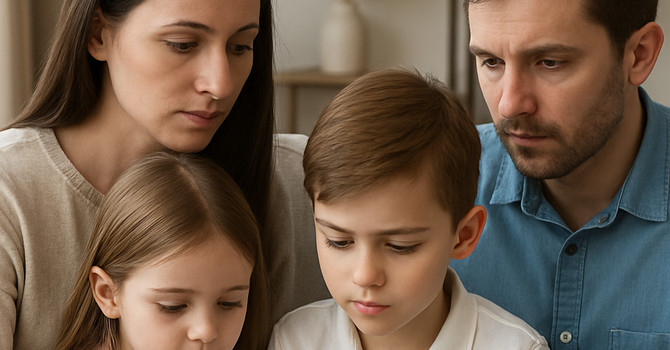
Living with your parents as an adult can be a unique experience, but when you add your own children into the mix, the dynamic shifts in profound ways. Multigenerational households are more common than ever, with economic factors, caregiving needs, and cultural traditions often bringing families together under one roof. But what does this mean for the psychological well-being of parents who are raising their own children while living with their parents? Let’s explore some of the key psychological impacts.
1. The Complex Balance of Roles
One of the most immediate challenges is navigating the shift in roles. You might still feel like a child in your parents' home, but you're also a parent yourself, responsible for your own children’s well-being. This dynamic can create tension, as you balance the need for autonomy with respect for your parents’ rules and preferences.
Parents often experience a clash between their adult identity and the familiar role they played as their parents’ child. The shift in authority can lead to feelings of regression or frustration, especially when grandparents overstep boundaries or revert to “parenting” their adult child. It's important to establish clear roles and boundaries, but doing so can be emotionally exhausting.
2. Boundaries and Autonomy
Living with your parents can blur the lines between your role as a parent and their involvement in your child’s upbringing. While having extra help can be a lifesaver, it can also lead to conflict if there’s a difference in parenting styles. Your parents may unintentionally undermine your authority by stepping in to discipline your children or spoiling them in ways that disrupt your efforts.
For some, this intrusion can lead to feelings of inadequacy, as if they’re not fully in control of their parenting decisions. The constant negotiation of boundaries—between how you parent and how your parents would like to help—can lead to increased stress and emotional strain.
3. Emotional Support and Strain
Living in a multigenerational household can be both a source of emotional support and strain. On the one hand, being close to your parents might offer comfort, especially when raising young children. They may be a source of wisdom, experience, and hands-on assistance.
On the other hand, emotional strain is common when personalities clash, or when the parent feels their choices are constantly being judged. Parental advice, while well-intentioned, can sometimes feel critical, creating an emotional burden. This can result in feelings of guilt or resentment, especially when the arrangement feels like it comes at the cost of personal or parental independence.
4. Financial and Practical Relief
The financial relief of living with your parents can be a huge psychological benefit. By reducing housing costs or receiving help with childcare, many parents feel less burdened by the stresses of daily life. This can create space for a more relaxed home environment, allowing parents to focus more on their children and self-care.
However, with this relief comes the pressure of feeling indebted or dependent. For some, there may be an internal struggle about being unable to provide independently for their family. This can lead to feelings of shame or anxiety about the future, especially if there is no clear timeline for moving out or establishing financial independence.
5. Impact on Partner Dynamics
If you're raising children with a partner, living with your parents can also impact the dynamics of your relationship. Privacy is often reduced, which can strain intimacy and communication. Partners may feel like they're under the microscope or have less space to manage conflicts privately.
In some cases, parents may unintentionally take sides in disagreements, further complicating the couple’s ability to work through their challenges independently. This can lead to a feeling of being overwhelmed, as parents juggle not only their relationship but the added complexities of managing family dynamics.
6. The Benefits of Community
On a positive note, living with your parents can create a deep sense of community for your children. Children in multigenerational households often benefit from close relationships with their grandparents, gaining emotional security, a stronger sense of family history, and varied role models.
For the parent, there is also the potential for a rich, shared experience of caregiving. The “it takes a village” mentality can offer relief from the isolating pressures of modern parenting. When family dynamics are healthy and boundaries respected, the collaborative nature of raising children alongside grandparents can foster a strong support network.
7. Self-Identity and Growth
Finally, living with your parents as a parent offers a unique opportunity for self-reflection and growth. As you navigate the challenges of raising your children while living with your own parents, you may become more aware of how your upbringing shapes your parenting style. This can lead to positive changes, as you reflect on the aspects of your own childhood that you want to replicate or avoid.
However, the experience can also stir up unresolved issues from the past. Childhood wounds may resurface, prompting you to re-examine your relationship with your parents in a new light. This can be difficult, but ultimately, it offers a chance for healing and personal development.
Conclusion
Living with your parents as a parent is a complex, multifaceted experience that brings both challenges and rewards. While it offers financial relief and emotional support, it also demands careful boundary-setting and self-awareness to maintain healthy family dynamics. By embracing open communication, flexibility, and mutual respect, families can navigate the psychological impacts and create a nurturing environment for all generations involved.
.JPEG)
.JPEG)





